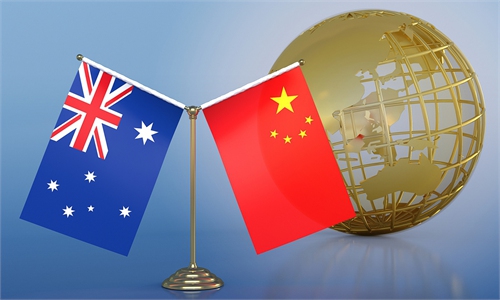
Illustration: Chen Xia/GT
Australia is making unwise decisions.Australia announced on Tuesday that it will increase an additional 11 billion Australian dollars ($7.25 billion) in defense spending over the next decade. It will acquire six Hunter-class frigates, 11 general-purpose frigates, three air warfare destroyers, and six state-of-the-art surface warships that do not need to be crewed. The revamp of Australia's naval fleet intends to more than double the number of warships. As a result, the plan would see Australia increase its defense spending to 2.4 percent of its GDP, above the two percent target set by its NATO allies.
After Australia announced this multibillion overhaul of its navy, VOA analyzed it as "a growing unease in Canberra about China's military and territorial ambitions." According to senior Australian officials, the frantic expansion is due to "increasing geostrategic uncertainty." Australia seems to be embarking on a militarized path of "arming to the teeth," but is this a wise choice for Australia?
From joining AUKUS in 2021 to increasing the proportion of defense spending in GDP, Australia has been continuously developing its military strength. However, "this is actually completely incompatible with Australia's geopolitical situation, surpassing the country's security demands," Chen Hong, director of the Australian Studies Center at East China Normal University, told the Global Times.
According to Chen, from a geographical perspective, Australia is surrounded by the sea and has relatively secure relations with neighboring countries. In reality, it does not need such a strong defense force to support its situation. "Australia's current actions and reasons are untenable," Chen added.
The Australian government has been cutting spending on education, healthcare, welfare, and other areas in recent years, while increasing investment in defense spending. This shift in priorities has pleased the US but has actually harmed the interests of its own citizens. The biggest beneficiary of Australia's huge defense spending is the US, as they are the world's largest arms dealer and rely on stirring up tensions to sell weapons. What else can Australia's increased military purchases bring, other than being welcomed by the US?
Canberra appears to be feeling greater insecurity and increasingly views China as a potential threat, leading to its decision to pursue continuous expansion of military capabilities. However, in reality, what truly makes Australia insecure is its blind following of the US' strategy and the anti-China hidden agenda of US-led alliances, such as AUKUS.
For Australia, it is very unwise to confront China. China and Australia have always been important partners. Since the Anthony Albanese government came to power, the relationship between the two countries has been steadily improving. Whether Australia is persisting in a military race to counter China as analyzed by Western media, treating China as a potential opponent is harmful and unprofitable for Australia.
Australia should not continue to follow the example of the US, using "national security" as a pretext for enhancing its military capabilities. For Australia, the navy overhaul seems to be a way to develop its military strength and elevate its position within the US alliance systems. However, Canberra's cooperation with Washington could potentially expose Australia to risky situations.
Acting as a pawn in the US Indo-Pacific Strategy could lead to Australia being used as cannon fodder, ultimately benefiting the US economically and politically, while Australia may end up sacrificing its financial and human resources, which is shortsighted.
Furthermore, Australia's militaristic approach will disrupt the existing balance in the Asia-Pacific region. "This will increase the possibility of a military race in the Asia-Pacific region and, to some extent, increase the distrust between countries in the region," said Ning Tuanhui, an assistant research fellow at the China Institute of International Studies. Therefore, the militarized path is a short-sighted solution for Australia and will have negative impacts in terms of politics and security for Canberra itself and the whole Asia-Pacific region.
The Asia-Pacific region should be a pacesetter of development and cooperation, not a chessboard for geopolitics. The stability and prosperity of this region should be treasured by all regional countries. It is imperative that Australia reconsiders its current path and avoids exacerbating regional tensions and conflicts. This can start by not blindly following the US's strategic agenda. Australia should strive to be a proactive force for peace and cooperation in the region, rather than contributing to further instability.


